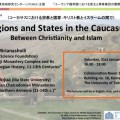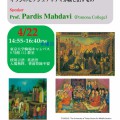Musical Heritage of the Syriac Orthodox Church: Its History and Present Situation
Special Lecture
The Syriac Orthodox Church is one of the Eastern churches, and many of its congregations have lived in the region covering south-eastern Turkey, north-eastern Syria and north-eastern Iraq. The main part of its musical heritage is the tradition of Syriac sacred hymns whose foundation was laid by St. Ephrem (4th century) and other saints and scholars through history, and it has been handed down for long at churches and monasteries. However, the genocide (Sayfo in Syriac), which took place in 1915 during WWI, in south-eastern Turkey where many Syriacs lived, forced them to go into the diaspora. The tradition of sacred hymns was also dispersed to many places, and now it is not only kept alive in Turkey, Syria and Lebanon, but also in Sweden, Germany, and the U.S.A. and farther in Australia. I will begin this presentation with a brief introduction of our church and the history of sacred hymns, and then talk about our efforts to preserve our musical heritage in the diaspora community.
Lecturer: Issa Habil
(Lawyer; Leader of Syriac Orthodox Choir (Sweden))
Issa Habil was born in 1967 to a Syriac Orthodox family in Beirut, Lebanon. His grandfathers, originally from Midyat in south-eastern Turkey, immigrated to Lebanon in 1915. Brought up in Lebanon and Qamishli in north-eastern Syria, he now lives in Sweden since 1986, where he worksas attorney at law and is also engaged in musical activities in the Syriac community. Since childhood, he served as deacon at mass and daily prayer where he learned Syriac hymns, and started musical studies in 1983. He now leads a choir of 60 amateur singers who sing secular and sacred songs with Middle Eastern orchestra. The choir gave many concerts in Sweden, the U.S.A. and Lebanon.
| Date |
Saturday 21st, February, 2015 16:30-18:00 |
| Venue |
Collaboration Room3, 4th Floor, Building no. 18, Komaba Campus, The University of Tokyo |
| Language |
English |
| Others |
The lecture will be in English, free, and open to the public. |
| Contact |
The University of Tokyo Centre for Middle Eastern Studies +81 3 5465 7724 |
| Download | Resume PDF |


